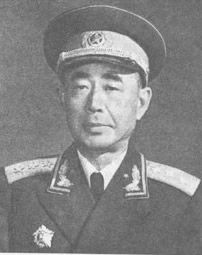Chen Mingren
| Chen Mingren | |
|---|---|
| 陈明仁 | |
 |
|
| Acting Provincial Chairman for Hunan Province | |
|
In office July 1949 – August 1949 |
|
| Chairman | Mao Zedong |
| Personal details | |
| Born | 7 April 1903 Liling, Hunan, Qing Empire |
| Died | May 21, 1974 (aged 71) Beijing |
| Political party | Communist Party of China |
| Alma mater | Whampoa Military Academy, Lushan Officer Training Corps |
| Awards |
|
| Military service | |
| Allegiance |
|
| Service/branch |
|
| Years of service | 1924–1949 (Republic of China) 1949–1974 (China) |
| Rank |
|
| Commands | Seventy-First Guomindang Army, Fourth Field Army |
| Battles/wars | Central Plains War, Encirclement Campaigns, Sino-Japanese War, Chinese Civil War |
Chen Mingren (simplified Chinese: 陈明仁; traditional Chinese: 陳明仁; pinyin: Chén Míngrén; 7 April 1903 – 21 May 1974) was a prominent military figure from Liling, Hunan Province. He was a top level military commander in the Republic of China before his defection to Communist China in 1949. Chen was awarded with the rank of General in 1955.
Chen was born into family of farmers in Hunan on 7 April 1903. He went through his education in private institutions and underwent military training in 1924. On 19 November 1924, he was transferred to the Whampoa Military Academy. Upon his graduation and stellar military performance during the Northern Expedition, he rose through the ranks quickly. By 1928, he was a colonel in the Republic of China Army.
He was the general of the 24th Revolutionary Army (ROC) during the Central Plains War whom led a Pyrrhic victory against Shi Yousan. He was appointed as the 88th Division commander in 1932 and led the Republican Armies against the Communist Party of China's Chinese Red Army in Jiangxi and Fujian during the Encirclement Campaigns. Following his defeat to the Communists in 1934 at Shaxian County, Chen was transferred to the Lushan Military Academy. Upon his graduation and the trust he had over Chiang Kai-shek, he was appointed into the Republican Senate for military affairs and became the Director of the Guomindang Military Department.
...
Wikipedia
